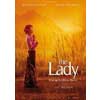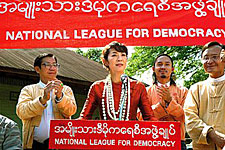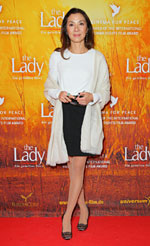AVIVA-Berlin >
Interviews
AVIVA-BERLIN.de im Februar 2026 -
Beitrag vom 24.03.2012

The Lady - Interview with Michelle Yeoh
Britta Meyer
Although she is best known for her roles in beautiful martial arts movies, Michelle Yeoh has long ago established herself as a skilled character actress. During her visit to Berlin, she talked...
... to AVIVA-Berlin about a project that meant much more to her than just an acting job.
In Luc Besson`s film "The Lady", she played the burmese Nobel Peace Prize winner Aung San Suu Kyi, in Burma better known as "Daw Suu".
AVIVA-Berlin: You met Daw Suu personally in 2010. Could you please describe your meeting with her?
Michelle Yeoh: The first time I met with Daw Suu was when she was just released from house arrest. At that time, we were still filming in Bangkok. We were almost finished and we wondered, "Why don`t we go?" So, we all handed in our passports and a few days later, Virginie Besson said: "Everybody`s visa has been rejected, except yours." For me, it was a great opportunity to meet someone who had been so much a part of my life and who had become my personal hero. I just had to go, and I did. On the way there, I was a little nervous, because people always tell you: "Don`t go and meet your heroes, you might be disappointed." But she is so much part of my life, I had to see for myself how real, how good this person, this woman, who inspired me, would be. I was not disappointed, it was one of my most memorable experiences. She is very honest and straight forward. All the things that I researched about her were very much there, it was really wonderful to see someone so slender filled with so much energy. Not wild energy, but very peaceful. When she talks to you, listens to you, she makes you feel like a family member. I guess I was bringing the outside world to her. Since 1988 she has not been allowed to leave and she is a very curious person, very giving, very maternal. You feel at ease in her presence. When we were filming, we did it under a different name in Thailand, because we were advised to. We did not want to create any problems for the people who worked with us. There are quite a few people who don`t get credit, because they still have families in Burma and they have requested that their names will not be mentioned. I thought that I would just go there, leave, and nobody would ever know I had visited the country. But on my way leaving Rangoon, at the airport, I heard a yell: "Michelle!" So, I turned around and there was one of the NLD-members that I had met while I was at Daw Suu`s house. We had spent the afternoon chit-chatting and had become very good friends. Then, I heard another one say: "This is Michelle Yeoh!" I thought: "Oh-ohãÎ," turned around and saw about twenty photographers, who had been following Daw Suu. So, it was officially out of the bag that I had gone to visit Daw Suu. Right away, it was in the press.
AVIVA-Berlin: How did Daw Suu react, when you told her that you were making a movie about her?
Michelle Yeoh: Before we made the film, Luc Besson took great pains to get a message to Daw Suu, to let her know. We were also confident that she would not say no, she has always impressed upon artists to express their feelings. At the end of the movie, we quote her: "Use your freedom to promote ours." She has always been very protective and shy about her personal life. If you would tell her: "You have done so much, you are such an icon," she would say: "This is not me, this is not about one person." But in our days and age, we understand how important iconic figures are, they help us come to terms with what they represent. So, we knew that she would not say no, but I have heard her say: "Why would anybody want to watch a two-hour-movie about ME?" That is very her. Personally, I did not do this movie for her viewing it, it is for the rest of the world to understand the plight of the people of Burma. We have used her as a representative, so that it can be a human story people can relate to and understand what has been going on in Burma. The reason why I say that is, because I think it will be a very, very hard movie for her to watch. It is probably one of the saddest moments of her life. She never saw with her own eyes what was happening to her husband Michael Aris and what her children had to go through. It will not be easy for her to see it actually played out.
|  |
ôˋ Universum Film |
AVIVA-Berlin: How did you manage to act out the feelings that she could have had?
Michelle Yeoh: You have to trust your own instincts. As an actress, you have to believe that you have done as much research as possible. Everything after that is your own interpretation. There were moments, when I thought I could not ask Kim, Daw Suu`s son, because some things are still very raw and painful, even today. In the end, it is a labour of love, you put in as much as possible and then you just have to trust yourself. Of course, it is our interpretation, as close to the truth as we could. Only one person can really know this truth, and that is Daw Suu.
AVIVA-Berlin: Did the fact that you and Daw Suu are both buddhist influenced the way you worked?
Michelle Yeoh: We can be born Buddhist, but we have to practise to be a good Buddhist. I was asked:
"How can a mother choose to stay in the country and to be separated from her children?" But as a Buddhist, your family is not blood-related, the whole world is your family. It is enlightment that you practise upon. It is suffering, but Buddhists do not relish in suffering. Through true suffering you understand what is the goodness that comes beyond it. You gain a slightly better understanding of compassion, of how to let go, it is not about revenge or retribution. So, Daw Suu and me having that same philosophy did help me tremendessly.
AVIVA-Berlin: When you met her, what was your impression of her condition? How was she doing?
Michelle Yeoh: At the time when I met her, she was not feeling so well, she had a bit of the flu. All the time she had been isolated and suddenly all these people were coming to her. It was tiring for her, because her very rigid routine was complete havoc. But you could feel a sense of fire, there was strength. When someone is very slim, you feel like that person is so fragile, she is going to break in two, and you never feel that way about her. You could feel the great sense of strength. I think it comes from her inner strength and that helps. It was one of the biggest things to find out where all this strength, all this courage, this resilience and fortitude comes from. I really believe that it comes from love. She had the love of her husband and the commitment that her children were taken care of. When her husband died, she still knew that the children were with her husband`s family and better off in England than with her in Burma. As an actress, you try to find things and experiences in your own self that can relate to your role. I could not, I had been doing this only for a few months and it was really an effort, to be that committed. She has been doing it for twenty years. It takes a different kind of person. I truly believe that it is a sense of love that keeps you believing. Her being Buddhist played a great role in that. In Asia, particulary in Burma, people are very spiritual, it is a key part of life. It is a great sense of compassion and forgiveness. When I was there, Daw Suu introduced me to her NLD-members and she said:
"He has been in prison for twenty years, and she, sixteen years, this one, eleven years, and this one ã baby! ã four months only." All of them were smiling and seemed happy, I thought:
"You have to be kidding meãÎ" There has to be a sense of compassion for you to be able to believe that your cause is greater than your own selfish needs. What comes at the end of the day is the journey, not just the way to it.
AVIVA-Berlin: Would you say this has been the most important role for you personally?
Michelle Yeoh: I have been very blessed to work with the most talented directors and artists in the world. This has become more than just a film, this has been an experience, a journey, for everyone who has gotten involved. It is one of my most important roles. You are very lucky when you can do a movie that entertains and makes sense, but you are so much more blessed when it has a very important message. We did not make this movie to teach or to preach, but her story is one that really does carry a message and opens eyes. In my publicity travels for the movie, I met a teenager who said to me:
"I have taken my human rights for granted, because I don`t have to fight for them." It is fantastic, when their eyes open in that way! These are the future leaders of our world, they are the ones that are going to change the world. There is the saying
"Ignorance is bliss," but I don`t believe that. Ignorance is not bliss, bliss is when you
know, when you have a choice, that is when you can make a difference. This film gives you an idea of what happened, a lot of people do not really remember what happened at that time in Burma. Since her release, it has been in the news constantly and I think people do understand what is going on there right now.
AVIVA-Berlin: It is a highly emotional story. What was the most challenging scene you had to act?
Michelle Yeoh: For me, her speech was a very crucial key. It was very powerful and very necessary, it was the turning point for her people and herself. There was also her walk towards the guns, it was very important to impart that she came to these men with no fear. They could have shot and killed her at any point, but it is the freedom of fear in her whole philosophy, that was the key. Of course, the whole end sequence, with those brutally raw emotions, on the phone with Michael Aris and her son, right until the very end, when she received the news of her husband`s passing, those were the challenging key points, but at the end, the emotions were not difficult to play. Understanding having children or the loss of a person, you can feel that.
AVIVA-Berlin: The film starts with the diagnosis of Michael Aris having prostate cancer. How strong is the relationship to her family linked with her relationship to her country?
Michelle Yeoh: You really feel that the people around her are her family. That is the very Buddhist way. Family is not just by blood, it is the connection that you have with the world. One of the most difficult interviews I saw her give was a day or two before Michael Aris died. The whole world knew about him dying, about him trying to get to see his wife one last time. The reporter asked about him and you could see, just for a little glimpse, how she had to contain herself, to say that there were people suffering a lot more than she did. It is so powerful, when someone can always put the needs of others ahead of herself. Like Martin Luther King and Nelson Mandela, she was inspired by Gandhi, by the whole non-violence approach. Of course, it is different, Mandela was in prison, not allowed to leave the country. If Daw Suu had said:
"I want to go back to England," they would have been so happy to send her! With Mandela and Africa it is also the issue of colour, the suppression of a "race".
AVIVA-Berlin: She survived by reading a lot, playing the piano and learning languages while she was under arrest. Why don`t we see that in the movie?
Michelle Yeoh: In the movie, you see her reading about Gandhi in the hospital, and at the end of the day, the book is with one of the other NLD-members. It was not so much about her daily life. We could have shown you what she was doing during house arrest, but we just wanted to show in very simple terms the complete isolation of this one woman, the coldness of it: her, standing by the window, the world always on the outside. She was really behind bars. We could have shown how she woke up at five, did her meditation, listened to the BBC radio. She was very disciplined, that was how she kept her sanity. It was also important to show the normality of what was happening in Oxford: the sons going to school, her husband going shopping, all the normal things that this woman was completey deprived of.
|  |
ôˋ Universum Film |
AVIVA-Berlin: Will "The Lady" be shown in Burma?
Michelle Yeoh: That is our biggest wish, and the wish of a lot of Burmese people. Luc Besson said that this is the one time he endorses movie piracy
(laughs). At the moment, we have not found a way to get it in. We hope that they will change their minds. When you accept history, that`s when you can really move on. It is very important for Burma to move forwards, not to stay in the past.
AVIVA-Berlin: Thank you very much!
Michelle Yeoh: Oh, thank you for your patience!
Weiterlesen auf AVIVA-Berlin:The Lady. Ein Film mit Michelle Yeoh von Luc Besson. Kinostart 5. April 2012Aung San Suu Kyi von Amnesty International ausgezeichnetPeace Women - Frauen mit dem FriedensnobelpreisDie Kinder der Seidenstraûe - Ein Film von Roger Spottiswoode